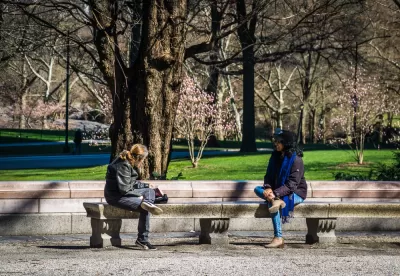An interview with Michael Berkowitz, former executive director of 100 Resilient Cities, finds a path to the light at the end of the tunnel.

Michael Berkowitz, former executive director of the nonprofit consultancy 100 Resilient Cities, speaks with Laura Bliss at CityLab for ideas about "how communities will survive the aftermath, as well as for opportunities to strengthen resilience now in the face of social and economic disruption."
According to Berkowitz, cities should be "linking various objectives together" to ensure that specific interventions strengthen the city across multiple areas. That's a key for all forms of resilience, according to Berkowitz, not just the kind of resilience necessary in response to the COVID-19 pandemic. For examples of the kind of governance he recommends, Berkowitz includes New York state, now the epicenter of the pandemic in the United States, where state and regional policies have driven the response, while mayors, like New York Mayor Bill de Blasio have taken the back seat.
Berkowitz also takes a position in the debate about the benefits and risks of density in a time of pandemic, as has been frequently discussed in the media in recent weeks, and says that, eventually, when cities reopen, density will benefit a recovery. In Berkowitz's words:
And when that next phase hits, that’s when we’ll see benefits of urban resilience — of neighbors checking in on each other, strong neighborhood institutions, diverse economies, good governance. Those things will pay off in ways that will let us rebound from this situation and hopefully let us build stronger communities.
The interview continues to touch on current opportunities to prepare for the recovery, including opportunities at the hyper-local level.
FULL STORY: What a Coronavirus Recovery Could Look Like

Planetizen Federal Action Tracker
A weekly monitor of how Trump’s orders and actions are impacting planners and planning in America.

Maui's Vacation Rental Debate Turns Ugly
Verbal attacks, misinformation campaigns and fistfights plague a high-stakes debate to convert thousands of vacation rentals into long-term housing.

San Francisco Suspends Traffic Calming Amidst Record Deaths
Citing “a challenging fiscal landscape,” the city will cease the program on the heels of 42 traffic deaths, including 24 pedestrians.

Amtrak Rolls Out New Orleans to Alabama “Mardi Gras” Train
The new service will operate morning and evening departures between Mobile and New Orleans.

The Subversive Car-Free Guide to Trump's Great American Road Trip
Car-free ways to access Chicagoland’s best tourist attractions.

San Antonio and Austin are Fusing Into one Massive Megaregion
The region spanning the two central Texas cities is growing fast, posing challenges for local infrastructure and water supplies.
Urban Design for Planners 1: Software Tools
This six-course series explores essential urban design concepts using open source software and equips planners with the tools they need to participate fully in the urban design process.
Planning for Universal Design
Learn the tools for implementing Universal Design in planning regulations.
Heyer Gruel & Associates PA
JM Goldson LLC
Custer County Colorado
City of Camden Redevelopment Agency
City of Astoria
Transportation Research & Education Center (TREC) at Portland State University
Jefferson Parish Government
Camden Redevelopment Agency
City of Claremont





























